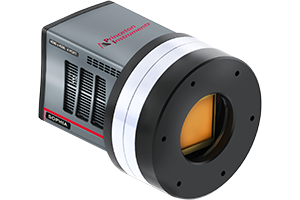New, Deep-cooled, Ultra-Large-Format CCD Cameras
June 21, 2018
Princeton Instruments anounces the immediate availability of deep-cooled, ultra-large-format SOPHIA 4096B cameras. Engineered for applications ranging from astronomy to fluorescence imaging, these back-illuminated CCD cameras are an excellent addition to Princeton Instruments’ popular SOPHIA product line. Also available immediately are deep-cooled SOPHIA 2048B cameras, which deliver high performance for an extensive set of low-light imaging applications such as astronomy, in vivo imaging, and semiconductor failure analysis.

Innovative SOPHIA 4096B cameras provide superior field-flattener performance via utilization of a reduced window-to-CCD–surface distance as well as minimized window thickness. This optimized optical design improves edge sharpness and lowers distortion. SOPHIA 4096B cameras incorporate the ability to “zero out” the variability in the mechanical assembly to achieve precise and repeatable CCD orientation. The CCD can be adjusted for tilt, pitch, and z-axis translation, reducing the requirement for system-level adjustments.
New SOPHIA 4096B camera models feature a back-illuminated 4096 x 4096 sensor format, 15 µm pixels, 100% fill factor, up to 3.5 ke– full well, >95% peak quantum efficiency, up to 18-bit digitization, read noise as low as 2 e– rms, and a 4-port, 16 MHz readout architecture for fast frame rates. SOPHIA 4096B cameras also feature Princeton Instruments ArcTec™, a proprietary technology that uses air or liquid to thermoelectrically cool to -90°C.
New SOPHIA 2048B camera models feature a back-illuminated 2048 x 2048 sensor format, 13.5 or 15 µm pixels, 100% fill factor, up to 1.5 ke– full well, >95% peak quantum efficiency, 16-bit digitization, proprietary ArcTec technology (thermoelectric cooling to -90°C), read noise as low as 3.5 e– rms, and up to 4-port, 16 MHz readout (>3 full frames per second).
“Our new ‘4096B’ and ‘2048B’ SOPHIA models are perfect for low-light-level, large–field-of-view imaging applications in the UV to visible range,” comments Michael Melle, imaging product manager at Princeton Instruments. “The 4096B, in particular, gives astronomers, life science researchers, engineers, and others an unprecedented combination of high resolution, high sensitivity, fast frame rates, and an optimized optical interface.”
All SOPHIA 4096B and 2048B cameras are supported by Princeton Instruments’ renowned 64-bit LightField® imaging and spectroscopy software, available as a system option. LightField provides hundreds of user enhancements, including a powerful built-in math engine to perform live data analysis. LightField also permits direct control from third-party packages such as LabVIEW® (National Instruments), MATLAB® (MathWorks), Python® (PSF), Maxim DL™ (Cyanogen Imaging), and ASCOM software.
Visit the SOPHIA product page for more information.
